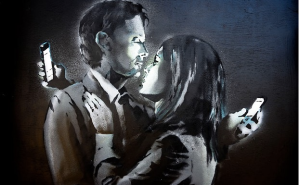If you have a Facebook account, I bet you are familiar with the thrills of stalking an ex-lover or an old flame online. You may not like to admit it, but we’ve all done it at some point, let’s face it.
You don’t need to be “friends” with anyone on Facebook in order to stalk. They may be the type that post status updates as “public”, or, even if their account’s privacy setting is tighter than a gnat’s chuff (excuse the vulgarity), they are bound to leave comments on someone else’s public “wall”, giving you ample glimpses into the goings-on in their life… One of their friends may have tagged them in a photo with their current partner, so by checking their friend’s Facebook photos, you can see what they’ve been up to, and, most importantly, whether they seem happy or not (with someone else)… The camera never lies.
At least that’s my personal methodology.
Social media is a stalker’s paradise. Twitter is mostly public, although some people have stalker-proof accounts with “protected tweets”, and on LinkedIn you can check daily who everyone is connecting with on a professional level. Many people like to upload their photos on Flickr, which may show you where they’ve been on holiday; their Pinterest pins will reveal topics they are currently interested in; Spotify and Last Fm can tell you what songs your “friend” has been listening to lately while GoodReads will give you a list of books they’ve been reading. And should they have a blog…my…you’re in for a treat, as you will also know what is going on in their minds.
I have often wondered whether I am a freakish creep to be so proficient at cyberstalking…but this Telegraph article made me realise that, when it comes to digital espionage, I am still, thankfully, an utter amateur.
The article lists at least four “stalking apps” that can be used to spy on your significant other’s digital activities: Mobile Spy, Mobile Stealth, StealthGenie and mCouple. For between £25 to £50 a month, these apps allow you to “view every text message sent or received by your partner’s device”, “get access to each other’s phone book” and “keep you informed about all Facebook chats”. Apparently even deleted messages can be checked and read by these apps, so once the spying software is trained on someone, there is no escaping.
What amazes me is that these apps are being used by couples in steady relationships. Obviously steady may not necessarily mean trusting, but why on earth have we grown so paranoid about what our significant others get up to when they go online that we need to bug their phones and eavesdrop on them 24/7?
A Washing Post article I read this weekend partly explains why. According to the piece, we live in an age of increasing digital infidelity, where men and women in a committed relationship, will flirt online with a potential “back-up partner”, or a former lover, to make sure they have an alternative, or a plan B, in case their current relationship goes belly up.
I will not play innocent and say I have never flirted online with a married man or one with a girlfriend, but then I am currently single, and each time I did it, I was only teasing a little, not seriously trying to provoke or suggest they cheat with me on their partners.
Having grown up in a Latino culture, I find flirting tremendously fun. To me, it is nothing more than a form of compliment a man can pay a woman or vice-versa. Social media, SMS, WhatsApp, Snapchat and the like have made flirting even easier because we tend to be bolder when we don’t have to confront someone face to face.
But not having to look someone in the eye when we talk, have also made breaking up that much easier to do via text messages (remember the breakups by fax in the old days?), as well as having the follow-up conversation trying to make up, or not, afterwards.
While chatting to a colleague, well, messaging her on Facebook, she confided in me she had “talked” to her ex-boyfriend about their breakup. When I said, “Really? When did you two meet?”, her answer was “We didn’t, this was all on What’s App.”
When we say “talk” these days, most of the time we do not mean we called someone, and it is even less likely we actually met them in person. Our concept of “talking” has shifted from sitting opposite each other across a table over a cup of coffee to frantically typing with one finger on our phones and tablets. We text talk on trains, buses, and from our work desks, hitting ‘send’ as we go, even when the subject involves emotions that can be easily misunderstood because written text, even when accompanied by the now ubiquitous emoticons, lack the emotive messages only body language can convey.
Which one of us haven’t at least once said on an email or text message the exact opposite of what we really wanted to say, either because we were too proud to tell the truth or because we were too hurt, or too afraid to say we loved them or missed them, or that we were truly sorry we had hurt them.
We miss out on the opportunity of sensing the other person’s true essence because we rely too much on phones and apps to communicate feelings that may make or break a relationship.
Are we becoming so superficial and lazy in our communication that love’s fate, the beginning of love as well as the end of it, is now dictated by a handful of texting apps, and directed by what what we see or don’t see in each other’s Facebook ‘Wall’ rather than on their faces?
I am not above any of this myself. I ought to stop stalking the man I long to be with and go see him in person for a drink. We would be able to hug each other tightly in real life; I would probably shed a few tears because I’ve been missing him so badly for so long. I would be able to ask him directly whether he is happy, and listen for the answer, with my eyes on his eyes, as well as my ears.
But I don’t do it, and I do not know I ever will. Maybe I’m afraid of what I would then see, so I hide behind a Facebook ‘Wall’ and become Peeping Tom instead.
We are scared to death of vulnerability, of being hurt, making fools of ourselves, and yet, without vulnerability, relationships cannot flourish.
We are hopeless cyber-cowards in the age of digital love. We find dates online, indicating our interest by swiping right or left on our phones; we fall in and out of love with avatars, we sext to seduce, have arguments on messages fired off on the move; we send smileys suggesting friendliness but don’t smile as much when we meet.
I don’t know about you, but I feel nostalgic about the good old love letters of yore.
“Dearest You, How are you… I mean, how are you really?”


